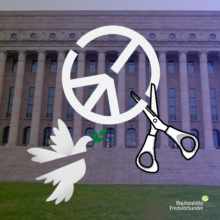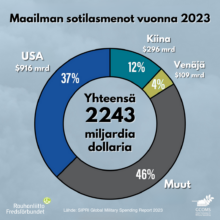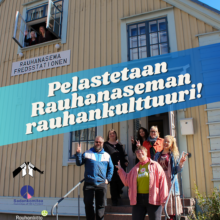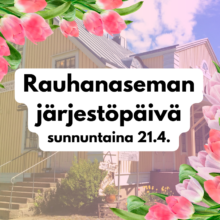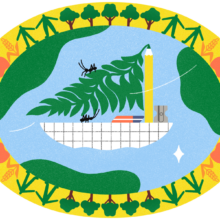Tarja Cronbergin puhe ”The Mutual Escalation and the Danger of Nuclear War” pohjoismaisten rauhanjärjestöjen konferenssissa
Rauhanliiton puheenjohtaja Tarja Cronberg piti puheen pohjoismaisten rauhanjärjestöjen Nordic Peace Alliance -konferenssissa Tanskassa 15. heinäkuuta 2023. Cronbergin puheenvuoro oli kokouksen osiossa, jossa käsiteltiin Ukrainan sotaa. Paikalla oli noin 60 osallistujaa Suomesta, Ruotsista, Tanskasta ja Norjasta.
The Mutual Escalation and the Danger of Nuclear War
By Tarja Cronberg, Peace Union of Finland, SIPRI
Wars end with peace negotiations and peace treaties, only if there is political will, on both sides, to reach for peace. Political will is not something that either exists or does not exist. Political will is always created. Sometimes by wise leaders on both sides, other times by exhausting either both or one of the parties. Political will can also be created by technological superiority on the one side or by superior resources, both financial or human, on the other.
So far there has not been any political will to end the war. Both sides claim that they will fight until they win the war. The president of Ukraine has even said that he will never negotiate with Putin. Furthermore, the West has a side interest in weakening Russia in the current superpower competion. Consequently, there is a risk is that the war will turn to a frozen conflict. A warning example is the Korean war that until now, 70 years after, is still without a peace treaty.
Two Escalation Patterns
So far, the war has escalated on both sides, but according to different patterns. On the Ukrainian and Western side through technological warfare and increasing Western technological support to Ukraine. Western technological support has step by step become more and more advanced and lethal. First starting by defensive technologies such as to secure the internet and counter cyberattacks, AI and drones. Then moving to more and more advanced levels to not only ammunition, but also German Leopold and US Adams tanks. This has been followed up by requests of F-16 fighter planes. The last debate has been about cluster bombs. Ukrainians have been continuously trained by western experts. Unity of the West has been an important goal and an expression of the West´s political will to help Ukraine win the war.
Western unity is, however, cracking. US has promised cluster bombs, while the UK has refused. At the NATO Vilnius summit there was an effort to try to balance escalation with non-escalation. Ukraine was not offered a time line although all the NATO leaders convincingly stated that Ukraine will be a member. On the other hand, the collective security guarantees by the G7 could be interpreted as an escalation. The critical question is this: Where is the limit and what are the longterm consequences of sharing the most advanced technology with one state in Europe?
On the Russian side the escalation pattern is different. Here the escalation is primarily about mobilization. Russia has, compared to Ukraine, a larger population and can expand the number of soldiers to a much greater extent. There is a limit, so the population in the dominant cities do not experience the impact of war. Consequently, mobilization has primarily taken place in distant regions to disperse the effects. In spite of this, hundreds of thousands of young men have left the country. Mobilisation of conscripts has been complemented by the use of mercenaries who have recently been recruited even from prisons and brought to the war scenes without adequate training. The recent conflict between the leaders of the army and the mercenary troops illustrates the difficulties in the use of mercenaries.
Another parallel line of the Russian escalation is the use nuclear threats. Russia is one of the nine nuclear weapon states of the world and has the most nuclear weapons in its arsenal. Today Russia´s superpower status in guaranteed by its nuclear weapons alone. Nuclear threats as such are not unusual, they are an organic part of nuclear deterrence, which during the cold war guaranteed that if attacked by nuclear weapons a nuclear state could guarantee mutual destruction and thereby deter the use of these weapons. The situation is now changing, and there is a real risk that nuclear weapons might be used. President Putin has threatened with these weapons indirectly by talking about “all the means” being taken into use and by referring to “catastrophic consequences never seen before”. The former president Medvedev has more openly talked about nuclear weapons and used nuclear blackmail. He has claimed that the West by delivering weapons to Ukraine should not challenge a state like Russia with a nuclear arsenal.
Peace Initiatives Do Exist
The mutual escalation has resulted in a number of peace proposals, mostly from the outside:
– President Zelensky, a month after the war start, mediated by Turkey- presented a proposal where the borders of 24.2.2022 would be respected and the question of Crimea would be negotiated later. Here the UK got involved and convinced Ukraine not to proceed with the proposal.
– Two proposals, one by Henry Kissinger the other by president Macron have suggested a peace agreement taking into account that Russia as a superpower and Putin as the president should not only lose. A longterm peace agreement should allow the Russia to see the agreement also as a victory. The idea has been dismissed as a gift to Putin.
– The Chinese have presented a 12-point proposal, which the West has rejected as too Russia oriented. This in spite of the fact that the first point underlines sovereignty as the basic principle.
– A proposal called Kiev Security Compact proposing “iron clad” security guarantees for Ukraine, by former NATO General Secretary Anders Fogh Rasmussen.
– Recently leaders of selected African nations, suffering from increased food prices, have discussed possible peace negotiations with both parties.
When looking at these peace proposals, there is one critical actor totally absent. The United Nations is the organization in charge of maintaining peace in the world. In the case of Ukraine, the United Nations has not even, as it usually does, sent a mediator to find out what kind of a peace platform would even be possible. Given that two of the permanent members of the Security Council with a veto-power are involved, the UN is a total lame duck and invisible on the war scene. The situation will be even more critical if a war breaks out between the US and China.
Furthermore, there is a depressing history: The League of Nations, established after the World War I, was not able to prevent the World War II. The United Nations was created after WWII and has not been able to prevent a war where the interests of the superpowers are involved. There are increasingly voices, for the abolishing of the veto power, but this seems to be impossible within the current UN structure. So far, the only reform in the UN has been that a member of the Security Council using its veto power should explain its motivation in front of the General Assembly. The role of the UN becomes even more critical when looking at the risk of a nuclear war.
The Risk of Nuclear War
The Russian nuclear threats have caused a debate on the risk of a nuclear war. The potential use of nuclear weapons has been debated, the conclusion often being that Russia might use tactical nuclear weapons but the likelihood is not very high. The five security council members, including Russia, have condemned the possibility by repeating the Reagan–Gorbatchev statement that “the nuclear war cannot be won and should never be fought”. Even the use of nuclear threats has been condemned as “inadmissible” by the G20 and three of the five SC members have deemed Russian nuclear threats as irresponsible. However, the Review Conference on the Treaty on the Non-proliferation of Nuclear Weapons (NPT) in August 2022 could only condemn the aggressive language, not the threats themselves.
The threat of a nuclear use is serious as confirmed by the US National Security Advisor Jake Sullivan on the eve of the Vilnius NATO conference. “It is a threat. It is a real threat. It’s one we need to take seriously. And it is one that does evolve with changing conditions on the battlefield.”
While the threat is serious, the international community is poorly prepared for it. The condemnations are ad hoc, there is no authority to deal with the risk of nuclear war. The situation is also absurd, as the decision is dependent in one man. In the US it is the president only, in Russia it is three men, Putin, the Secretary of Defence and the chief of army. As Putin´s voice is the one that counts, it is understandable that international debate on nuclear war is concentrated on one question: What does Putin think? While no one has the answer, the red lines currently are expected to be: Firstly, if there is a risk that Ukraine could retake Crimea. Secondly, if there is a physical risk for Putin.
The fate of humanity should not depend on what a president thinks. A self-evident solution would be to abolish all nuclear weapons, as proposed by the states that have ratified the Treaty on the Prohibition of Nuclear Weapons into force since 2021. As none of the nuclear weapon states have signed or ratified the treaty, on the contrary the five permanent members of the SC have underlined that they do not ever intend to do this, prohibition is not an immediate solution. Nevertheless, the current command system is an obvious argument against nuclear weapons.
In the aftermath of Hiroshima there were a number of radical governance proposals transferring the responsibility to international institutions. Oppenheimer, the main nuclear scientist, proposed that the UN should create an international atomic development agency to control all fissile material. At the time, the scientist, Hans Morgenthau even proposed a world government in order to avoid the national control problems. In the past 70 years this discussion has died out. The institution that was established, the International Atomic Energy Agency, only evaluates non-compliance by non-nuclear states in relation to the NPT-rules. The nuclear weapon states and their procedures are not subject to any guidelines or control.
Nevertheless, there is an urgent need for a stronger international institutional responsibility for the governance of national decisions on nuclear threats and use. So far we have been lucky, but ”luck is not a strategy” as so ably pointed out by the General Secretary of the United Nations, Antonio Guterres. Among the Nordic Peace Unions we should be able to develop a strategy to promote the prohibition of nuclear weapons in the longterm. In the shortterm international measures are needed to control that no one person is able to initiate a nuclear war.


